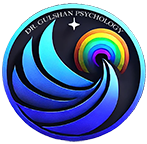
You Are Not Broken: Understanding PTSD & C‑PTSD
Welcome
If you’ve ever wondered why you
can’t “just move on” from painful experiences —
or why you feel so much, so deeply,
even when life looks good on the outside —
you’re not alone.
Many high-achieving professionals and creatives carry invisible wounds from the past.
These experiences can shape how we think,
feel, connect, and cope,
even years after the danger has passed.
PTSD and C‑PTSD aren’t just clinical labels —
they’re names for real survival strategies, disconnection, and pain.
And they’re more common than you think.
You are not broken.
You are becoming whole.®

What Are PTSD and C‑PTSD?
Post-Traumatic Stress Disorder (PTSD)
is a mental health condition that may develop after a single traumatic event —
such as an accident, assault, or natural disaster.
Complex PTSD (C‑PTSD)
arises from repeated or prolonged trauma,
often beginning in childhood.
It may involve emotional neglect,
chronic stress,
or environments where shutting down was the only way to survive.
While PTSD often shows up as fear-based symptoms (like flashbacks or hypervigilance),
C‑PTSD can feel more internal —
chronic shame, emotional numbness, difficulty with trust,
and a persistent sense
that something is wrong with you.
Both conditions can deeply affect
your self-worth, relationships,
and ability to feel safe —
especially if they’ve gone unspoken or untreated for years.

Common Signs of PTSD and C‑PTSD in High Achievers
Perfectionism or relentless self-criticism
Difficulty relaxing or feeling emotionally safe
Trouble trusting others or opening up
Chronic guilt, shame, or imposter syndrome
Emotional shutdown, overworking, or overdelivering
Feelings of numbness, emptiness, or detachment
Coping through avoidance, compulsive habits, or substance use
The sense that you’re always “performing” wellness
These symptoms don’t mean you’re failing.
They once kept you safe.
Now, they may be holding you back.
With the right support, you can shift from surviving to truly living.

Healing Is Possible — With the Right Support
Trauma therapy is not about endlessly rehashing the past.
It’s about reclaiming your voice, your choices, and your sense of self.
As a licensed psychologist in New York State,
I offer therapy for adults 18+ using trauma-informed, evidence-based approaches
tailored to high-achieving professionals and creatives.
My approach is:
Evidence-based, using Cognitive Processing Therapy (CPT),
Cognitive Behavioral Therapy (CBT), and Positive Psychology
Collaborative and adaptive, honoring your autonomy and pace
Safe and nonjudgmental, with practical tools for managing overwhelm
Culturally sensitive and strength-based, attuned to your story and identity
As part of my trauma-responsive work, I also offer Haunted House Therapy™ —
a metaphor-rich framework I developed to support people navigating deep, layered trauma.
Haunted House Therapy™ helps you explore the inner architecture of your experience,
reclaim your narrative, and reconnect with parts of yourself that were hidden, lost, or silenced.
Whether this is your first time seeking help or you’ve tried therapy before without feeling truly seen —
you are welcome here.
Learn more:
Curious about working with me?
Request a free 30-minute, no pressure consultation:

You Deserve to Heal
Healing won’t take away your ambition, your creativity, or your edge.
It will help you integrate your experience, soften your inner critic, and feel more at home within yourself.
You are not broken.
You are becoming whole.®

